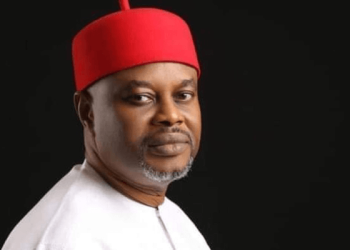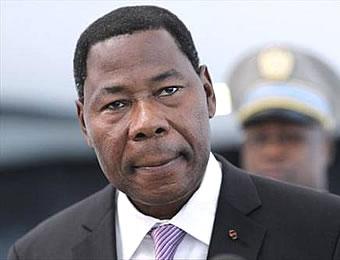Even for a population long accustomed to pervasive corruption, recent revelations of graft in high places have been mind-boggling. While the United States officials and President Muhammadu Buhari discussed how to recover about $150 billion of oil wealth stolen from Nigeria in the last 10 years in Washington, anti-graft investigators at home were reviving cases involving the theft of billions of naira of public funds. Nigerians should support the President’s resolve to uproot corruption and spare no one in the new war.
Encouraging signals suggest that the war on graft may just about to begin in earnest. The first was the defeat of the incumbent, Goodluck Jonathan, in the March 28 presidential election. The stench of corruption that oozed from that administration was perceived around the world. The replacement of a President who famously declared that “stealing is not corruption” with a Spartan ex-General with a reputation for discipline and hatred for graft, raised hopes that the 16-year-long looting spree in Nigeria could end soon. Another is the enthusiastic support of world powers and our development partners, solidified by pledges from the US and other western governments to help recover the $150 billion loot stashed in their countries.
Most reassuring, however, have been steps by Buhari to walk the talk such as: Emerging news that the hard task of tracing the paper trail and plugging leakages have actually begun; and unlike his hypocritical predecessors, the body language of the President has galvanised agencies that could not bark or bite in the old dispensation into action. The Economic and Financial Crimes Commission has recently arrested, arraigned, questioned or “invited” no fewer than 10 highly Politically Exposed Persons. Agencies that once routinely pocketed public revenues now want to remit to the Federation Account.
The world will hold Buhari to his word that he will spare no one found wanting. “If any of my associates or party member is indicted of corruption, they cannot escape justice. There is not going to be any APC (All Progressives Congress) member or any close personality (relative) that would escape justice,” he thundered. He is treading a sure path by the strategy of making institutions strong and efficient and without overt interference.
We however urge caution in his plan to merge the anti-graft agencies into one “very strong and well-funded” entity to avoid creating another lumbering, ineffectual bureaucracy. We strongly recommend the removal of the current heads of the EFCC, the Independent Corrupt Practices and Other Related Offences Commission and the Code of Conduct Bureau, all of whom have failed the litmus test of principled independence under the corrupt Jonathan administration. He should determine whether Solomon Arase can be relied upon to get the job done as the Inspector-General of Police without waiting for a wink or a nod from the Presidential Villa.
Revitalising productive, job-creating activities, institutions and restoring order to public finances must start with a real war on corruption. The monster has effectively prevented Nigeria’s development and stymied all hopes of pulling 70 per cent of the population out of poverty. The United Nations Development Programme’s estimate that $400 billion was stolen from the country between 1960 and 1999 is believed by some to be understated. The $150 billion stolen in the last decade as confirmed by the Global Financial Integrity, is more than the $100 billion that the World Bank said Nigeria needed to invest in power in 10 years to lift supply to an acceptable level and tackle poverty and unemployment. The US Department of Energy calculates that Nigeria earned nearly $500 billion from crude oil in the five years to 2014 and about $1 trillion in 50 years, yet, 76.8 million of the 170 million population lacked access to drinking water in 2014, according to UNICEF; 64 million were illiterate, says the National Mass Education Commission; while over 50 per cent still lack access to basic health care services.
The impunity must not only be stopped, those involved must also be punished. A revelation that a former minister in the Jonathan administration stole $6 billion is typical. Buhari’s allegation that even up to July 10, some “people in government” were illegally selling 250,000 barrels of oil per day demonstrates the audacity of corruption. On Wednesday, Nigerian Extractive Industries Transparency Initiative said that 160 million barrels of oil worth $13.7 billion were stolen on the watch of the Nigerian National Petroleum Corporation between 2009 and 2012. The President should not be swayed by sentiments such as the irrational allegations of witch-hunt and sectionalism. Or by those who say “let’s move on.” We cannot move on without resolving our sordid past.
Buhari should build a very strong institutional anti-corruption platform. He needs a strong-willed, independent-minded Attorney-General of the Federation, who, unlike the last two occupants of the post, will reinvigorate the anti-graft war and clean up the weakened directorate of public prosecutions. Reforming the EFCC, the ICPC and the CCB should involve a radical overhaul of their scandalous investigations and prosecution that have seen them losing high profile cases for years. The police brass should stop making the force the personal enforcer of the incumbent and his inner circle and become an effective, independent agency. Law enforcement is now driven by science and technology; agencies must develop intelligence-gathering capacity using well-funded and equipped forensic laboratories where finger-printing, photography and DNA testing figure highly.
We expect a strengthening and enforcement of the rules on financial transactions, as well as severe sanctions against bankers and banks that aid corruption and money laundering.
Where corruption is rife, development is constrained. Singapore recognised this and set up its Corrupt Practices Investigation Bureau in 1952 even before its independence in 1959, with its leaders seeing corruption control as a matter of national survival. China’s latest anti-corruption campaign began in 2012, targeting both PEPs and lowly officials and has so far netted 99 high-ranking officials, among them, top generals and four national leaders. Punishments have included long prison sentences and executions. Transparency International reports that Georgia, Liberia and Rwanda, three countries emerging from civil war and turmoil, separately launched successful anti-corruption campaigns that won global acclaim.
The lesson is that strong political will, reforms and building of resilient and independent institutions guarantee success in any war against entrenched corruption. Nigeria should toe this path and Buhari has a historic chance to break with 40 years of corruption and inertia and uproot corruption as a national culture.













































